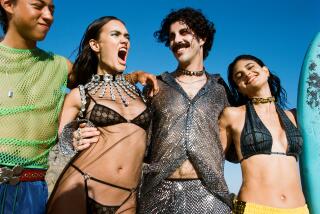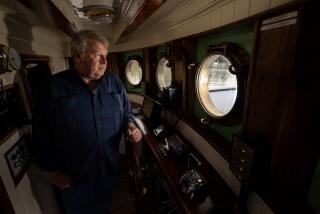When It Was Clear Sailing on Zobie’s Cat
- Share via
Editor’s note: Mark Beal is a commercial sea captain and professional fisherman from Perth, Australia. He sailed with Bison Dele on the former NBA player’s catamaran from February until June 2001. Thirteen months later, Dele would disappear from the boat with a girlfriend, Serena Karlan, and the captain, Bertrand Saldo. They are presumed dead. Beal provided The Times with this account of life in the South Pacific with Dele.
We’re in the Southern Ocean in the teeth of the Roaring Forties, 500 nautical miles from the nearest land mass, Australia.
It feels as if we’re on a gentle roller-coaster ride, gliding along at eight knots down the face of 15-foot swells. The wind hums through the rigging, and I can hear the water slap our hull and then hiss and die, the way small waves do when you’re standing on a beach.
The sun shines on the open stern end of this 60-foot boat. Half a dozen albatrosses bank and glide behind us. Occasionally, one will dive and then pivot 180 degrees on a wingtip, on the very surface of the water.
The guy who is paying for all this reaches into a bucket of fish guts and throws a handful over the water. “Hey birdie,” he calls. “Come and get it.”
With a growling squawk, the nearest albatross skims the water for the food. There’s always more where that came from. Behind us trails a shutter cord with a hook and lure. Soon enough, another 30-pound blue tuna will be hauled in.
My passenger is a big black guy, wearing sunglasses and what we call a beanie, to keep his head warm. The smile on his face reminds me of a child’s.
He wanted to be called Zobie--a name he took from a song--instead of Brian Williams, or Bison Dele. He liked Australia because the people didn’t know he was a guy who’d turned his back on the NBA and more money than they’d make in three generations. They just took him for what he was, except in the sports section of a department store in Melbourne, where he went one day looking for size 17 shoes. He picked up a basketball and started dribbling. The staff was astonished. They were basketball fans and recognized him. They offered to contact his sponsor for more shoes. “It’s OK, man,” he told them. “I’m not sponsored anymore.”
His tourist visa had been good for six months, but he’d been in Australia for at least a year and a half, getting two-week extensions on the visa, driving around the country in his F100 with a motorbike, a kayak and six skateboards, just camping anywhere.
Zobie had fallen in love with Fremantle, a port town just south of Perth. He rented an apartment there and wanted to buy a boat to take him across the Pacific. That was how I met him.
Somewhere in his future was a boat pen at a yacht club in L.A. for this catamaran, the Hakuna Matata. But for now, there was a voyage from Perth, my hometown, to New Zealand, with anybody he liked along for the ride. He just wanted to spend two years sailing the Pacific, ending up in California.
I’ve been a commercial sea captain and professional fisherman for 22 years, more than half my life. I’ve seen celebrities, taken them out to sea, and in the confined space of a boat, you really get to know someone.
Zobie really was a nice guy. I see that personality in a lot of people and it’s got nothing to do with the sea. Some people are here for greed. Some people are here to smell the breeze and have a look around them. Some people have their head in a paper or a computer and are too busy to do anything else. The difference with Zobie was he had the money and the time to look around.
We talked a lot about the NBA, and those were the only times I saw him really stressed.
“Hey, dude,” he’d say, “these guys push you and push you, you get injured, you’re broken and strained and they push you out there.”
He was disdainful and a bit cynical of the hype and the attention paid to something that was just a game. He felt like his soul hadn’t been put in the right area. That’s why he was into all the hippie stuff.
I met some friends of his from Israel who were backpacking around Australia. He’d always go for the hippie types, the feral ones. They were into the cosmic world and spirituality and soul searching. These people don’t have anything else in their lives. He was just doing it for fun, and he’d never done anything like it before.
When we caught the tuna in the Southern Ocean, I got him to pull them in by hand. They’re dark blue with flecks of yellow. He’d pat them and say, “What a beautiful fish.” Then he’d thank the ocean for the fish, and the fish for providing us with food.
He got seasick only once, when we were running before a storm in the Southern Ocean, trying to reach the sheltered waters closer to Australia. We ended up in Melbourne, just as the Formula One Grand Prix came to town.
We arrived in Melbourne about 1 a.m. Later that morning, Zobie grabbed his skateboard and disappeared. He was gone the rest of that day and the following night.
I’ve been around enough celebrities to know they live in a different world. It’s smaller than ours and they all seem to know each other. When we got to Melbourne, Zobie disappeared. He was a friend of David Coulthard, one of the Formula One drivers.
When he returned, it was with a film crew. They were including him in a documentary on the Grand Prix.
It was a big weekend in Melbourne. Cirque du Soleil was also performing. Zobie knew someone there, too. We got free tickets to the celebrity tent and spent the night drinking champagne.
That was unusual--the drinking, I mean. Zobie was very straight. He said he never drank when he was in the NBA. He just wasn’t into it. He told me he’d get into trouble with his coaches because he’d want to go home and sleep in his own bed, rather than in the team hotel before a home game. He’d say, “Coach, you know I don’t go out and party. I just want to be in my own bed.”
When we were ashore, he wanted to live as much as party. He always wanted to kick a soccer ball around, ride a bike or try some tricks on one of his skateboards. We stopped for Easter just north of Sydney, a place called Pittwater. I was able to talk him onto a surfboard, but not into standing up. He caught some waves lying down on my longboard.
The other side of life in the NBA was that he could afford to travel like this. We were in a beachside cafe one day, and saw a big rug with a French abstract design hanging on the wall. Zobie fell in love with it and wanted to buy it.
I went to the counter and asked if it was for sale. It was, for $2,000.
So he went around the corner, pulled $2,000 out of an ATM and paid for it. The rug went into the lounge of the catamaran. The boat had cost him $600,000. I spent a couple of weeks preparing it for the trip. On one of those days, I bought a small dive compressor, to provide air for scuba diving. Then we went to a dive shop and bought two complete scuba outfits. By the end of the afternoon, there was another $5,000 on his gold card.
We talked about money sometimes. I said if I had lots of money, I’d buy blue-chip stocks. “What if you stuck it in the bank and lived off the interest?” he replied. I guess that’s what he was doing
He was definitely into chatting about everything--a big thinker, and a very clever man, very practical with mechanical things.
Zobie had an emotional side, but I never saw any aggression. I believe he suffered from manic-depression. There were times when he was really low--you could see it in his face. He would say he was grumpy. He wasn’t trying to hide it. He was quite open with everything. Those moods never lasted more than two days.
I don’t know what went on in the basketball scene. I don’t think he wanted to take any medication. He never said or admitted he was manic-depressive--it’s my observation--but he used to get really down and really high.
He was a very sensitive bloke; wasn’t afraid to show emotion, although I never saw him cry. But then again, when you have a really strong connection with someone, and you want to show them how strong that connection is through sharing an emotion, he’d be crying with laughter sometimes when we talked.
We talked about his brother and his stepfather, so I knew of his brother’s existence, but it was only general, friendly conversation. There was no animosity or sense that anything was wrong.
There were seven of us on the boat when we left Fremantle in February 2000: five guys--Zobie, myself and Bruce, a deckhand, another guy who swam to shore after the first night and hitchhiked back to Perth, a fifth who got off two days later, and two women, Megan and Emily, whom Zobie had invited along.
Emily came along as his girlfriend, but it was pretty casual. In the Southern Ocean at night, we used to steer by automatic pilot, but there would always be somebody up on the deck keeping watch for four or five hours at a time. Zobie took his turn doing that, and Megan kept him company one night.
He’d say, “Hey, dolphins have sex for fun. Why hide the fact that we enjoy it?”
Some of our discussions were about life and death, almost literally. One of our sail plans, when we were still in Fremantle, was to go through Southeast Asia, where piracy on the open seas is a real problem.
I felt if we were going that way, we may need some weapons. Some people do carry them. I wasn’t sure. Zobie was totally against it. His feeling was, if we were boarded by pirates, we’d give ‘em what they wanted--give them the boat if we had to, as long as they spared our lives.
Instead, our trip took us through the Roaring Forties, and then up the east coast of Australia. I fell sick in Brisbane, and decided to head home to recover.
That was in late May, early June last year. Zobie took it badly.
“Hey, man,” he said. “Am I ever going to see you again?”
Of course, he didn’t.
We had a pretty deep respect for each other. When I first heard what had happened to him, I felt really sad.
There’s someone who you live in the same small place with, and share a lot of time with ... naturally, it’s a really sad thing.
Earlier this year, I broke a bone in my neck while surfing in Indonesia where I was working. There was no insurance and it cost me a fortune to get back here.
You have time to think while you’re recovering from something like that, and what I think is, it could have been worse. I might have been on the boat with Zobie in July near Tahiti.
More to Read
Sign up for The Wild
We’ll help you find the best places to hike, bike and run, as well as the perfect silent spots for meditation and yoga.
You may occasionally receive promotional content from the Los Angeles Times.






